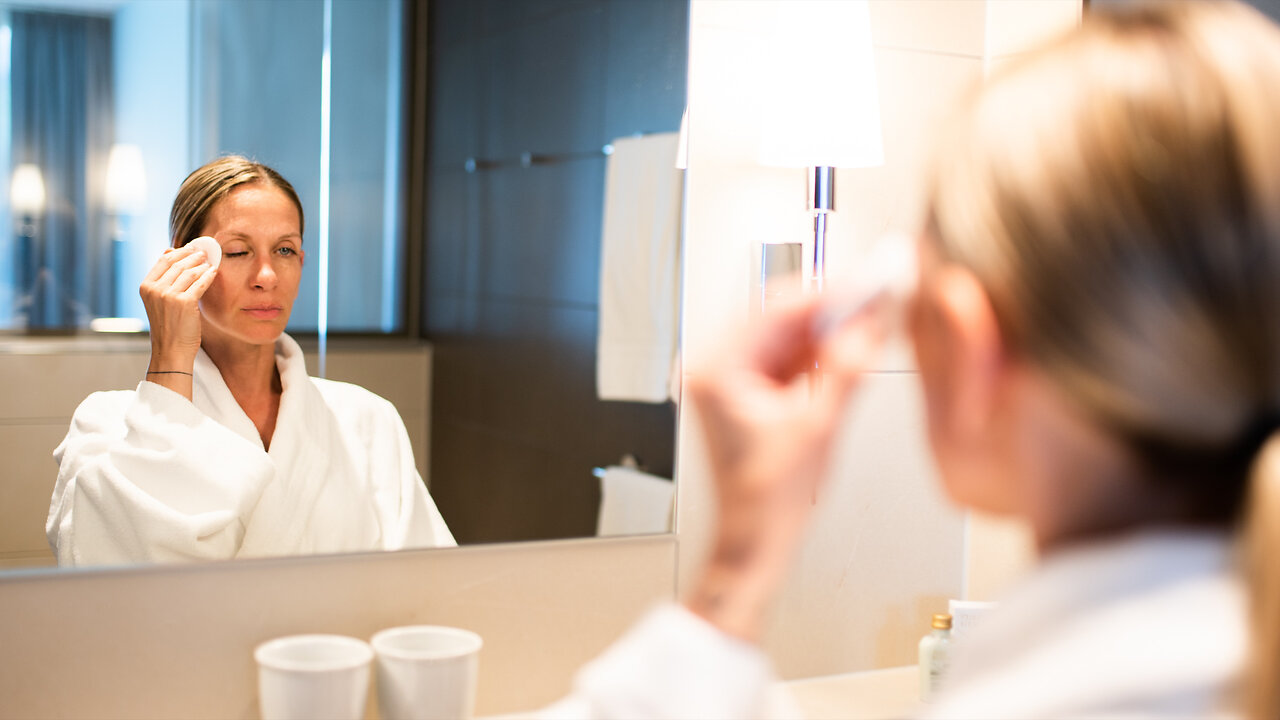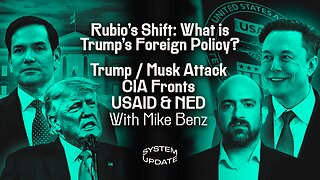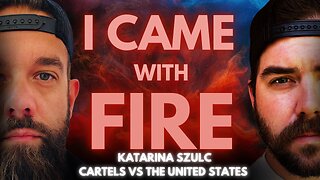Premium Only Content

Average American starts caring about their skin at this age
Americans only start taking their sun-related skincare seriously at age 26, according to new research.
The poll of 2,000 U.S. adults found that before their mid-20’s, Americans aren’t taking proper care of their skin — which might be why respondents are four times as likely to get scalded by the sun than they are to use sunscreen.
The survey found 79% have experienced sunburn, while only a fifth admit to using facial sunscreen (20%) or body sunscreen (21%) daily.
Commissioned by Melanoma Research Alliance, the largest private nonprofit funder of melanoma research, and conducted by Talker Research, the survey also looked at the habits of different generations regarding sun protection.
Younger generations appear to be taking their skin health more seriously than older generations, as the results revealed that Gen Z are more likely to wear sunscreen daily, whether that’s body or facial sunscreen.
Over a third of Gen Z respondents reported wearing sunscreen daily (34% body, 35% facial), compared to about a fifth of Gen Xers (23% body, 18% facial).
The survey also looked at how sunscreen usage varies by season, with one in five Americans dropping the use of sunscreen all together post Labor Day.
Despite the chance of a sunburn regardless of the weather, seven in 10 Americans think sunscreen is a “summer essential” while only three in 10 respondents include sunscreen in their “winter essentials.”
No matter the season, 54% of those who have had sunburns are concerned about having irreversible damage to their skin.
The survey revealed that the top reasons motivating people to wear sunscreen include concerns about skin cancer risks (41%), the convenience of sunscreen incorporated into daily moisturizers (31%) and fears of premature skin aging (22%).
The survey showed that women were more concerned about skin cancer risks than men. Only 39% of men report that the risk of skin cancer would encourage them to wear sunscreen daily, compared to women (42%).
Despite 72% of Americans feeling knowledgeable about sun protection and 81% feeling informed about the risks of melanoma skin cancer, many respondents still aren’t incorporating sunscreen into their routine.
Seventy-two percent of respondents reported making sure that they have sunblock on when outdoors or in direct sunlight, while only 3% do so in less expected but potentially harmful situations such as when looking at a screen, on an airplane or at a nail salon.
“There are many common misconceptions about the importance of sunscreen and protecting your skin from the sun,” says Dr. Marc Hurlbert, CEO of Melanoma Research Alliance. “No matter if it’s a sunny or cloudy day, if you plan to stay indoors, or if you’re sitting by a window, in a plane, or in a car, it’s important to wear sunscreen daily – all year round – to protect yourself from harmful rays that can cause melanoma.”
When looking for more information about sun protection, respondents were equally likely to turn to search engines like Google as they were their doctor (32%).
Twelve percent also turn to social media, with Facebook (57%), YouTube (53%) and TikTok (47%) as the top platforms respondents are looking at for their queries about sun protection.
The survey data reveals that 39% of Gen Z prefer online search engines for sun protection, while 44% turn to social media, with 8% deciding to not rely on any specific source for such information.
Not only are respondents lacking the use of sunscreen in their everyday lives, but they are also lacking visits to the dermatologist as only 34% of Americans surveyed see a dermatologist, with 21% of them visiting less than once a year.
The survey also reveals that 54% of respondents prioritize their normal doctor appointments over dermatology visits, and about half are more likely to see a dermatologist for other skin-related issues like rashes, itchiness or eczema rather than to check for melanoma.
Despite the risks of melanoma, the survey also revealed various factors that influence people to not wear sunscreen, including the time of year (28%), overcast or rainy weather (23%), and daily UV index levels (12%).
“At Melanoma Research Alliance, we always say the best sunscreen is the type that you’ll use daily,” says Hurlbert. “Whether it’s mineral or chemical sunscreen, or paired with the use of wide brimmed hats and UPF clothing, it’s important to protect yourself daily, and visit your dermatologist annually for a skin check.”
TOP 7 REASONS WHY AMERICANS DECIDE TO WEAR SUNSCREEN:
● Avoiding sunburns 58%
● Concerns about skin cancer 56%
● Preventing premature skin aging 39%
● Skincare benefits 31%
● Doctor recommendations 19%
● Avoiding getting tanner 8%
● Social Media 6%
Survey methodology:
Talker Research surveyed 2,000 Americans; the survey was commissioned by Melanoma Research Alliance and administered and conducted online by Talker Research between Aug. 3 to Aug. 8, 2024.
We are sourcing from a non-probability frame and the two main sources we use are:
● Traditional online access panels — where respondents opt-in to take part in online market research for an incentive
● Programmatic — where respondents are online and are given the option to take part in a survey to receive a virtual incentive usually related to the online activity they are engaging in
Those who did not fit the specified sample were terminated from the survey. As the survey is fielded, dynamic online sampling is used, adjusting targeting to achieve the quotas specified as part of the sampling plan.
Regardless of which sources a respondent came from, they were directed to an Online Survey, where the survey was conducted in English; a link to the questionnaire can be shared upon request. Respondents were awarded points for completing the survey. These points have a small cash-equivalent monetary value.
Cells are only reported on for analysis if they have a minimum of 80 respondents, and statistical significance is calculated at the 95% level. Data is not weighted, but quotas and other parameters are put in place to reach the desired sample.
Interviews are excluded from the final analysis if they failed quality-checking measures. This includes:
● Speeders: Respondents who complete the survey in a time that is quicker than one-third of the median length of interview are disqualified as speeders
● Open ends: All verbatim responses (full open-ended questions as well as other please specify options) are checked for inappropriate or irrelevant text
● Bots: Captcha is enabled on surveys, which allows the research team to identify and disqualify bots
● Duplicates: Survey software has “deduping” based on digital fingerprinting, which ensures nobody is allowed to take the survey more than once
It is worth noting that this survey was only available to individuals with internet access, and the results may not be generalizable to those without internet access.
-
 1:25
1:25
SWNS
5 days agoThis is why many women are behind on their doctor's appointments
221 -
 LIVE
LIVE
Akademiks
5 hours agoKendrick Lamar Sweeps Grammys. Drake announces new album on Feb 14. Rocky Trial Might get Dismissed?
3,210 watching -
 LIVE
LIVE
BrancoFXDC
2 hours ago $0.42 earnedWarzone Rebirth Rounds
567 watching -
 1:44:14
1:44:14
Glenn Greenwald
9 hours agoRubio's Shift: What is Trump's Foreign Policy? Trump/Musk Attack CIA Fronts USAID & NED: With Mike Benz | SYSTEM UPDATE #401
73K58 -
 1:05:47
1:05:47
Donald Trump Jr.
11 hours agoMexico Sends Troops to Border, Plus USAid Scam Exposed, Live with Brooke Goldstein & Rep Brian Mast | TRIGGERED Ep.213
222K153 -
 9:26
9:26
Rethinking the Dollar
6 hours agoUnbelievable Government Waste: 5 Outrageous Biden-Era Spending Sprees
37.6K13 -
 2:37:43
2:37:43
Flyover Conservatives
1 day agoDR. KIRK ELLIOTT | Deep Dive: Tariffs, Tech, and Total Economic Warfare – Who Wins and Who Loses? | In Studio - FOC Show
42.4K2 -

Danny Polishchuk
8 hours agoTariffs and Trade Wars + Nick Rochefort | Low Value Mail #136
30.3K1 -
 2:04:40
2:04:40
I_Came_With_Fire_Podcast
10 hours agoCartels vs The United States, Fentanyls 2 Front WAR, and FTOs
14.1K -
 4:54
4:54
CryptoWrld
11 hours ago $1.07 earnedCrypto Startup Launches Tokenized US Treasury Bonds
20K3